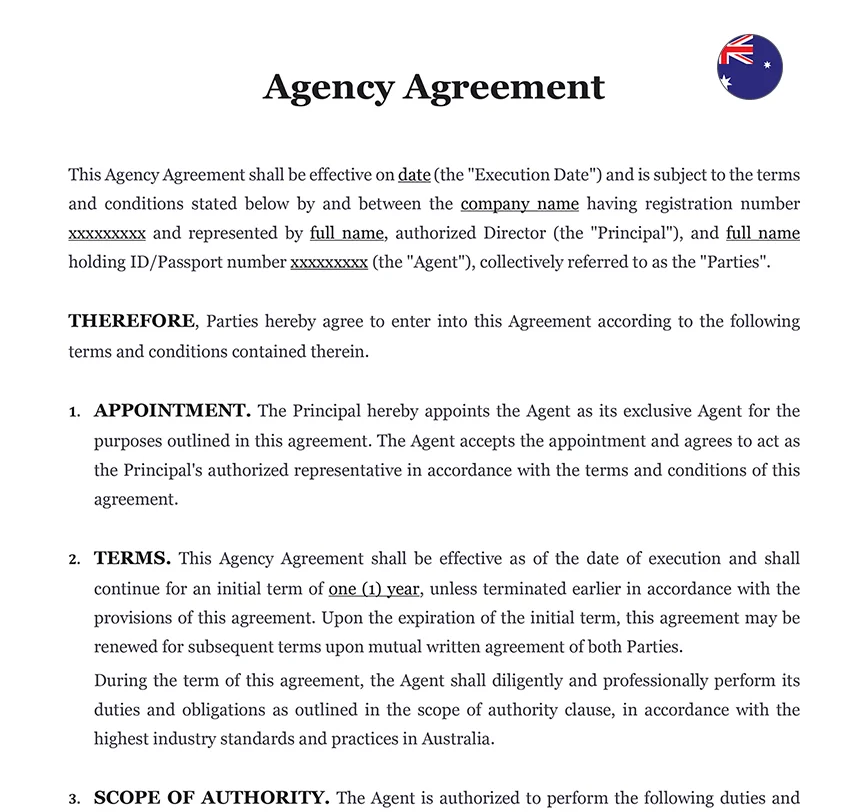The Role of a Business Agent in Australia
Selecting a competent business agent is one of the most significant decisions you’ll make for your business. A business agent can represent your interests in negotiations, manage property transactions, or oversee other critical aspects of your business dealings. However, the foundation of this relationship is the Agency Agreement, a legally binding document that outlines the duties, responsibilities, and expectations of both parties.
An Agency Agreement is not just a formality; it serves as a blueprint for the working relationship between you and your agent. It details everything from the scope of services provided to the terms of payment and dispute resolution mechanisms. Without a clearly defined Agency Agreement, you risk misunderstandings, legal disputes, and potential financial losses.
Understanding the Agency Agreement
Before hiring a business agent, it’s essential to understand the components of the Agency Agreement and how they protect your business.
1. Scope of Services: The agreement should clearly define the services the agent will provide. This could include tasks such as marketing, sales, property management, or other business-related functions. Clearly outlining these responsibilities ensures that both parties have a mutual understanding of the agent’s role.
2. Authority of the Agent: Specify the extent of the agent’s authority to act on your behalf. This might include the ability to negotiate and sign contracts, make financial decisions, or represent your business in other capacities.
3. Term of the Agreement: The duration of the Agency Agreement should be clearly stated. This could be for a fixed term (e.g., one year) or an ongoing arrangement that can be terminated by either party with notice.
Understanding these components is crucial, especially when considering other agreements that might interact with the agency relationship. For example, our article on Formalizing Client Service Contract: A Legal Guide discusses how service agreements play a role in defining business relationships.
Selecting the Right Agent
When choosing a business agent, it’s important to evaluate their qualifications, experience, and reputation.
1. Experience in Your Industry: Look for an agent with extensive experience in your specific industry. Their knowledge of market trends, regulatory requirements, and industry-specific challenges will be invaluable in helping you achieve your business goals.
2. Reputation and References: Check the agent’s reputation by reviewing client testimonials, references, and any industry certifications. A well-regarded agent with a track record of success is more likely to provide reliable and effective services.
3. Communication Skills: Effective communication is key to a successful agent-client relationship. Your agent should be able to clearly articulate their strategies, provide regular updates, and be responsive to your needs.
Negotiating Terms and Fees
Once you’ve chosen an agent, the next step is to negotiate the terms of the Agency Agreement.
1. Fee Structure: The agreement should outline the agent’s fee structure, including any commission rates, flat fees, or hourly rates. Ensure that you fully understand how the agent will be compensated and that the fee structure aligns with your business objectives.
2. Performance Incentives: Consider including performance incentives in the agreement. For example, you might offer a bonus for meeting certain sales targets or achieving specific business milestones.
3. Termination Clauses: The agreement should include clear terms for termination, whether for cause or without cause. This ensures that both parties can exit the relationship if it becomes necessary.
Legal Considerations in Agency Agreements
Legal considerations are a crucial aspect of drafting and signing an Agency Agreement.
| ➤ Compliance with Australian Law: Ensure that the agreement complies with all relevant Australian laws and regulations. This includes any industry-specific legislation that may apply to the agent’s services. |
| ➤ Dispute Resolution: Include a dispute resolution mechanism in the agreement, such as mediation or arbitration, to address any conflicts that may arise between you and the agent. |
| ➤ Intellectual Property Rights: If the agent will be handling any intellectual property, such as trademarks, patents, or proprietary information, ensure that the agreement clearly defines the ownership and usage rights. |











